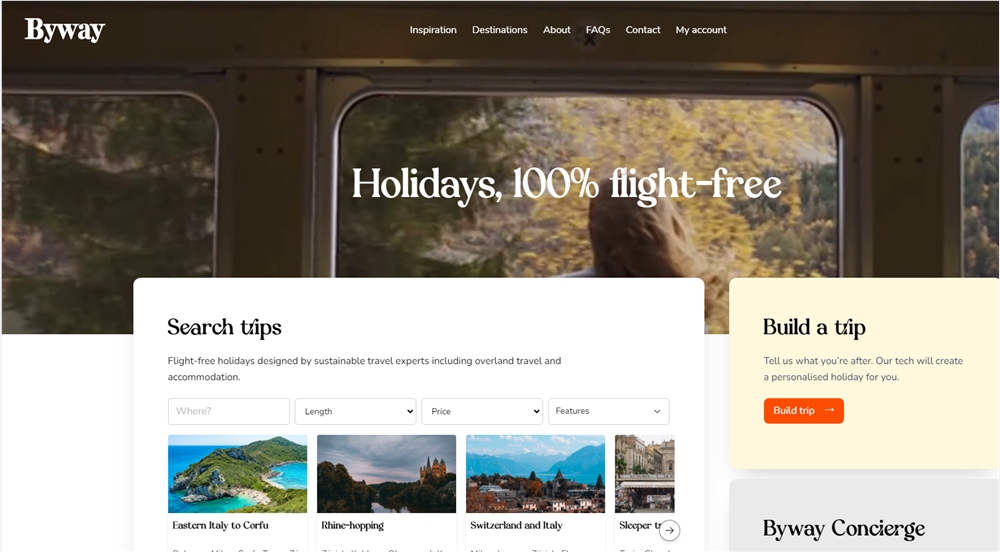British travel technology company Byway recently announced the completion of a $6.4 million Series A financing, which will be used to expand its artificial intelligence-based flight-free travel planning services. This round of financing was led by Heartcore Capital, with participation from Eka Ventures and multiple angel investors. Byway was founded in 2020 during the COVID-19 epidemic and focuses on slow travel and sustainable tourism. Its unique AI travel planning technology, JourneyAI, can design personalized routes according to user preferences and has a flexible design to deal with itinerary interruptions. Currently, Byway has sold more than 4,200 trips, with an annual growth rate of 300%. Its successful model also provides new ideas for sustainable tourism development. The editor of Downcodes will give you an in-depth understanding of Byway’s secret to success.
At a time when the global tourism industry is undergoing major changes, British travel technology company Byway announced the completion of approximately US$6.4 million in Series A financing, which will be used to promote the expansion of its artificial intelligence-based flight-free travel planning services. This round of financing was led by Heartcore Capital, with participation from Eka Ventures and multiple angel investors.
It is reported that the establishment of Byway was quite dramatic. In March 2020, just as the COVID-19 epidemic was sweeping across Europe, founder Cat Jones decided to start this company focusing on slow travel and sustainable tourism. To date, Byway has sold more than 4,200 trips, with an annual growth rate of 300%, fully proving the viability of its business model.
Jones said: "We firmly believe that slow travel and more sustainable travel methods are booming. Byway is unique in that its travel products do not rely on planes at all, but instead take place over land (and sea) via train, bus or ferry, allowing holidaymakers to enjoy sights off the beaten track and avoid crowded popular attractions.

AI-driven travel planning
Byway’s core competency lies in its proprietary AI travel planning technology, JourneyAI. The system can design personalized travel routes based on user preferences, transportation schedules, fare information and past success stories. Currently, about 60% of vacation packages are booked online, which means customers use JourneyAI directly for travel design.
Jones explained: Our AI must not only design a pleasant route, but also ensure that the journey has a certain immunity to interference. To cope with potential disruptions to multi-stop overland travel, JourneyAI has built-in resilience to quickly provide alternatives when original plans are disrupted.
The combination of artificial intelligence and human services
Although AI technology plays a key role in Byway's business, human services still occupy an important position. About 40% of sales come from human concierge services, where staff communicate with customers and design travel plans that meet personalized needs.
In many cases, technology works very well, Jones said, but there are certainly cases where human intervention is needed to improve the service. The company has also set up a WhatsApp group for customers to ensure that passengers can receive support at any time during the journey.
The future of sustainable tourism
Byway's success is not just a business story, but also reflects an important trend in the tourism industry. Environmental concerns are prompting more and more holidaymakers to seek ways to fly less, while many popular tourist destinations are grappling with the effects of overtourism.
Jones said: "Multi-stop overland travel changes the pace of travel and creates opportunities for an alternative form of travel that is less harmful to the environment." They can also extend economic benefits to more places and take pressure off tourist hotspots.
future development plan
With the completion of the new round of financing, Byway plans to further expand the size of its team, especially adding engineers, to strengthen its investment in JourneyAI technology. The company is also preparing for regional expansion, including setting up a base in the Netherlands to cope with post-Brexit regulatory requirements.
Once we complete the Eurobond application, we can start promoting our services to the entire European market, Jones said.
In the context of sustainable tourism receiving increasing attention, Byway’s innovative model and latest financing undoubtedly bring new possibilities to the field of tourism technology. With the continuous advancement of artificial intelligence technology and the growth of consumer demand for environmentally friendly travel, Byway's development deserves continued attention from the industry.
Byway’s successful case shows that the combination of artificial intelligence technology and sustainable development concepts can create a more environmentally friendly and personalized travel experience, providing a new direction for the future development of the tourism industry. The editor of Downcodes believes that Byway’s future development is worth looking forward to!